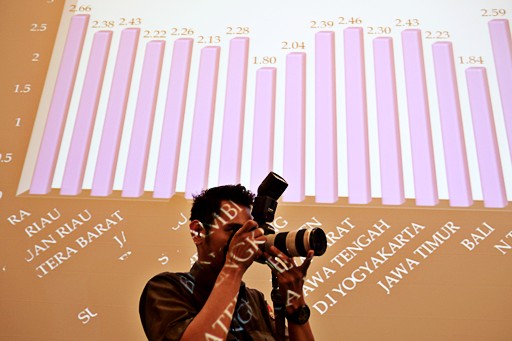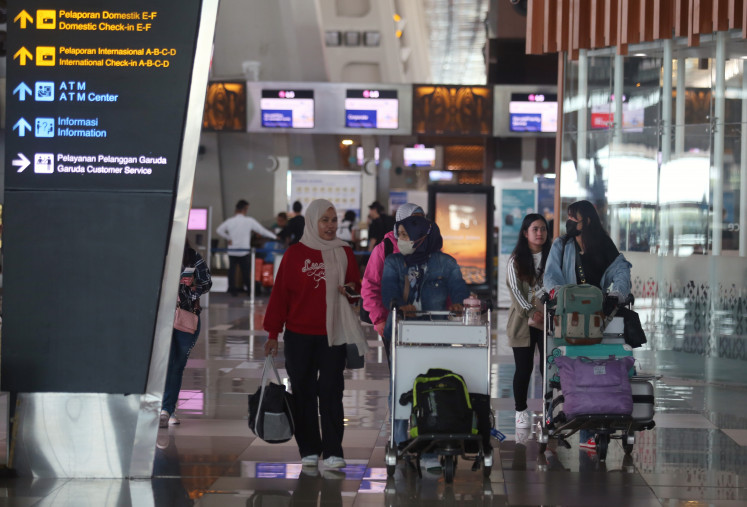Public rationality in simultaneous local elections
It is time for the public to be critical and vigilant in local democratization. Do not let middlemen and rotten businessmen and politicians take over power in the regions.
Change Size
 In focus: A photojournalist takes his place in front of a screen showing an election-related violence index compiled by the Election Supervisory Agency (Bawaslu) ahead of the simultaneous local elections on Dec. 9. General Elections Commission (KPU) chairman Husni Kamil Manik said the noken voting system would be still used in 2017 regional elections in Papua
(thejakartapost.com/DON)
In focus: A photojournalist takes his place in front of a screen showing an election-related violence index compiled by the Election Supervisory Agency (Bawaslu) ahead of the simultaneous local elections on Dec. 9. General Elections Commission (KPU) chairman Husni Kamil Manik said the noken voting system would be still used in 2017 regional elections in Papua
(thejakartapost.com/DON)
T
he simultaneous regional elections are moving closer to the decisive moment. Stage after stage of the 101 regional direct elections held on Feb. 15, 2017 will determine local leaders for the next five years.
The upcoming elections will be a critical phase to prove the reliability of the electoral democracy process in the near and far future. Therefore, it should be noted that election management should succeed not only in procedure but also in substance.
Holding simultaneous regional elections is genuinely a national effort to make the historical transformation of democracy consolidation from a regional to a central level. Therefore, regional elections should reflect volunteerism in politics and the people’s political participation.
Robert A. Dahl, in his book Dilemmas of Pluralist Democracy: Autonomy Vs Control ( 1982 ), emphasizes two variables in democracy, namely contestation and participation. This implies that the democratic quality of the regional elections is not only defined by the contesting candidates but also public participation.
One significant element that needs to be well understood by all parties is communication to prevent conflicts in the simultaneous regional elections.
First of all, the General Elections Commission (KPU), Election Supervisory Agency (Bawaslu) and the candidates should communicate intensely with each other, abiding by the principle of mutual understanding.
Those who do not win will be unhappy. However, their expressions of disappointment should be delivered through the appropriate channels, according to the law and regulations.
For example, candidates who accuse their rivals of fraud should be wise in protesting and advocate through legal mechanisms, such as filing a challenge with the courts.
Evidence and arguments are the main aspects of solving a dispute. In contrast, hate speech, like provocation, defamation and libel, is counterproductive and will only trigger conflicts and acts of crime.
On the other hand, the poll committees should keep their impartiality intact. They need to be thorough, transparent and consistent in explaining the rules of the game to all parties.
Second, when it comes to information dissemination, the poll committees may trigger conflicts. Suspicion that a committee is favoring one of the candidates has arisen. The pattern of information between the KPU and candidates, for instance, is questionable.
There are unclear information patterns on, for example, voter lists (DPT), the distribution of poll materials, vote recapitulation schedules and other technical matters.
Another related issue is the irrelevance of equivocal communication (EC) by the election committee. According to Janet Beavin Bavelas ( 1990 ), equivocal communication refers to message coverage that is intentionally made unclear, indirect and complicated.
When EC occurs in matters that the public need to be informed of immediately, dispute is inescapable. For instance, information about campaign procedures, voting recapitulation and violation procedures have to be communicated clearly to the public. The public needs transparent rules of the game so that the election can run as well as expected.
Third, conflicts in regional elections may also result from mainstream media and social media exposure.
Publication in the mass media and interaction on social media, intentionally or not, could stimulate conflicts when they follow the candidates’ provocative behavior.
The fourth possible cause of conflict is the dominant aggression of the elite. Referring to the theory of Dominic Infante in his book Argumentativeness and Verbal Aggressiveness ( 1996 ), there are two kinds of dominant aggressive behavior: fondness for debate and verbal aggressiveness.
This verbal aggression, which includes insults, threatening words and emotional teasing, produces anger, embarrassment and offense. Public figures, religious leaders, youth figures and other opinion makers should participate in promoting peaceful simultaneous regional elections.
Ideally, election management performance can be measured by both conventional and non-conventional political participation.
Conventional participation can be observed by the size of voter turnout. The more voters skip the election, particularly when the number of abstainers exceeds the winner’s margin, the worse the public participation.
Nevertheless, public initiative to monitor the management of the simultaneous regional elections is needed.
This kind of non-conventional participation was evident in the 2014 presidential election through the platform kawalpemilu.org, which compared the KPU data for vote recapitulation.
It is time for the public to be critical and vigilant in local democratization. Do not let middlemen and rotten businessmen and politicians take over power in the regions.
The electoral campaign season, which will begin this weekend, provides candidates a big opportunity to evaluate themselves ahead of voting day.
Image-centered campaigning should eventually be confronted with the construct of political rationality.
Revisiting neo-Weberian traditions, there are two types of rationality, namely substantive rationality and instrumental rationality.
Substantive rationality conceives political involvement as a manifestation of principles, beliefs and particular idealism.
Practicing politics should be an integrated, noble identity that is not sacrificed for the sake of a mere instrument of image reproduction.
A mobilizing campaign should be reality oriented, not image-oriented. Campaigns are a moment of truth for the candidates to show how much they comprehend the real, factual, substantial and urgent problems in society.
It is time for the electoral campaign to no longer offer imaginary abstract solutions.
***
The writer is executive director of the Political Literacy Institute and a lecturer in political communication at the State Islamic University (UIN) Jakarta.
---------------
We are looking for information, opinions, and in-depth analysis from experts or scholars in a variety of fields. We choose articles based on facts or opinions about general news, as well as quality analysis and commentary about Indonesia or international events. Send your piece to community@jakpost.com. Click here for more information.








